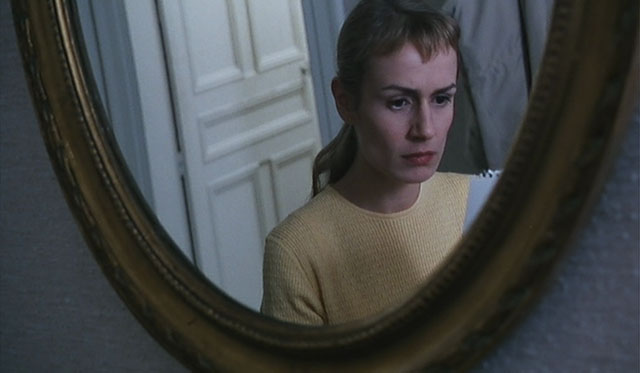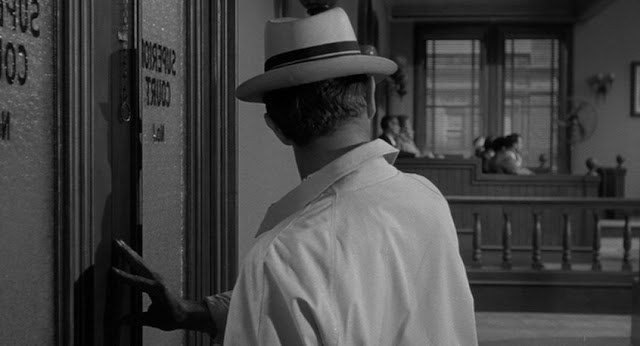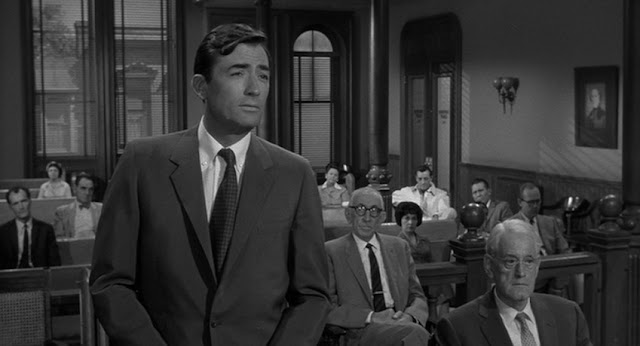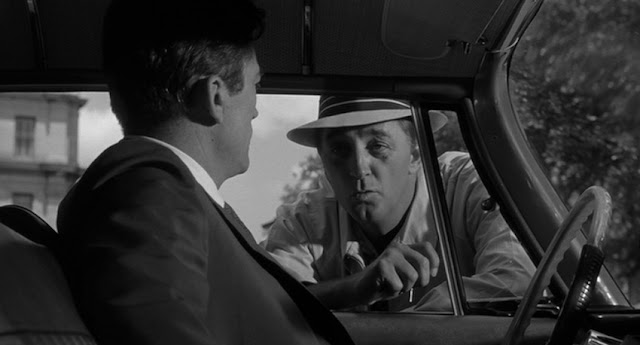Having been weaned on Sirk's influences, it is easy to accept the brilliance of his filmmaking. I often hear that viewers have a difficult time swallowing the excess of these productions, that the acting seems over the top, as does the filmmaking itself. In this age where irony is the main currency, I think the importance of Douglas Sirk should be more immediately apparent, even to new viewers. You can recognize traces of his style in the works of Paul Verhoeven and David Lynch, who specialize in satire disguised as kitsch, much like their predecessor. I initially discovered Douglas Sirk through other filmmakers who he has greatly influenced, like Werner Rainer Fassbinder, and Todd Haynes. Then, some quick research would often reveal that much of what I admired in their films was an homage to Sirk. Far From Heaven, for example, is basically a retelling of All That Heaven Allows. And I discovered that much of what I love about Fassbinder's work-- his lurid colors and the performative power of his characters-- are also references to Sirk. You can see the power of these images reverberating outward into so many films that follow them.
Thursday, November 17, 2011
Thursday, September 8, 2011
La Ceremonie
It's my great misfortune to have discovered Claude Chabrol's films just after he passed away. This means that, once again, I find myself smitten with a ghost. Chabrol is known as the French Hitchcock, and that's pretty apt, really. Much like Hitchcock, Chabrol uses thrillers as a psychological vessel, but with a characteristic that is definitively French. His movies are about feeling more than action, situation more than plot. Hitchcock had the Macguffin; Chabrol needs no excuse to engage in his scenarios of tension. I can't really claim to know much about Chabrol's filmography; I've only just begin. Likewise, I'm no master on Hitchcock, just a would-be diver dipping my toes in the pool. So, I should stick to those films I do know, one of which is Chabrol's 1995 film, La Ceremonie, a truly haunting portrait of class division and resentment. In La Ceremonie, the relationship of a family and their maid slowly becomes toxic, leading to a finale of sudden and irrevocable violence. This film is less of a thriller than a mystery. There is no central puzzle to unravel; the mystery lies in the hearts of the characters themselves.

Sunday, August 7, 2011
Sundry things
I am fixing things, ever so slowly. Google's campaign for world domination has wrought some negative effects on my little corner of the blogosphere. Luckily, the damage is reversible. Just painfully tedious to pick-through, html-wise. Here is another picture, to get us through the dark times:


Wednesday, August 3, 2011
Pardon my dust
You might have noticed that a lot of my images seem to have disappeared overnight and turned into sad, indifferent little icons.
I've been using Picasa to store my images. Apparently they changed something within the past few days, which means I'm going to have to fix a lot of posts. Don't worry, it will be fine. In the mean time, here's a beautiful image from Days of Heaven, just for fun.
I've been using Picasa to store my images. Apparently they changed something within the past few days, which means I'm going to have to fix a lot of posts. Don't worry, it will be fine. In the mean time, here's a beautiful image from Days of Heaven, just for fun.
<

Friday, July 29, 2011
Mccabe & Mrs. Miller

I obviously have no idea what is was like to live in the West, but Altman's vision seems so real, I have a hard time imagining it to be any other way. Altman's movies are very special to me, because, unlike many modern-day independent films that grasp at verisimilitude through a "gritty" portrayal of reality (which often just seems to me like lack of imagination), Altman's movies actually sort of achieve this believability. At the same time, they are mythical enough to fascinate. Though the dialogue is "realistic" it rings much more true than the dialogue in, say, a mumblecore film. It is more like verite, but fictional. Roger Ebert puts it better than me in his Great Movies essay on the film: "All of the characters know each other, and the camera will not stare at first one and then another, like an earnest dog, but is at home in their company." As in real life, scenes are filled with overlapping, often inaudible chatter. But, as Ebert notes, "sometimes all that matters is the tone of a room."
Labels:
1971,
Julie Christie,
pomo western,
Robert Altman,
Warren Beatty,
Western
Tuesday, June 21, 2011
Thelma and Louise

I appreciate this movie for putting me back in touch with the child I used to be, the child who was just discovering the magic of the moving image, the magic that could suck you in and make you feel something different than you felt every day. If a movie struck some chord with me, I would start it again immediately after it finished, just to return to that feeling and to lose myself inside it. That kid had no idea that the study of movies, or books, for that matter, was even possible. She didn't have any aspirations or deep philosophies where movies were concerned. A movie was something that existed on a different plane of reality. In my dreams and fantasies, I could find my way back there. It was sort of like looking for the hidden gate to Narnia, which I was also obsessed with, once upon a time. Thelma and Louise makes me feel like that kid again. The only sign that I have grown up is that I resisted the urge to watch it again immediately, instead waiting until the next day.
Labels:
1991,
feminism,
geena davis,
neo noir,
Ridley Scott,
susan sarandon,
Thelma and Louise,
women
Wednesday, June 1, 2011
Meek's Cutoff

Meek's Cutoff has generated some buzz lately, for being that movie you have to see and pretend to enjoy whether or not you have any actual desire to do so. It's certainly a divisive movie. Complaints were audible as the viewers in my theater exited the film. Of course, also audible were awe, veneration, and theory-generation along the lines of "were they actually dead the whole time?" I thought this theory was a bit silly when I overheard it, but this line of thinking eventually led to my own conclusions. I understand what, I think, this person was trying to communicate. Meek's Cutoff approaches fantasy. It takes place in a mythical, intermediate space in which new things become possible. Really, the movie is about the settlers negotiating this new space. The premise of Meek's Cutoff is loosely based on a real historical anecdote, which, in a way, adds to its mythos. In the film, a fur trapper named Meek claims to know an alternate route around the Blue Ridge Mountains. Taking him at his word, a group of settlers follows him. They become hopelessly lost, and lost they remain.
Labels:
2010,
feminism,
Kelly Reichardt,
Meek's Cutoff,
Michelle Williams,
Western,
women
Monday, May 9, 2011
Double Dose: Women on the Verge and Beaches
I'm going to do something I don't normally do, which is to attempt to pull an Anthony Lane, and find some common denominator in the two very different films I've just watched. Beaches of Agnes and Women on the Verge of a Nervous Breakdown have more in common that you might think, although I might be the main link between them. The latter came to me accidentally. I'm a member of Facets, a Chicago based film organization that has a Netflix-esque rental program. I was told through an automatic email that I was receiving Claude Chabrol's La Ceremonie in the mail. Terribly excited, I tore open the package to find Women on the Verge instead. This was a movie I had always wanted to see anyway, and I took it as a sign from the universe. Agnes Varda is, after watching her latest, my newest fascination. I even recently got a haircut that is exactly like hers, circa 1968. Needless to say, I am feeling spiritual, my stars aligned with my cinematic muses. Aside from my cosmic attachments, the obvious connection between these two movies is that they demonstrate both a love affair with cinema, and an examination of the nature of love itself.
Monday, April 18, 2011
Cape Fear, 1962



Historically, Cape Fear comes at a transitional period in American Film making. Released in 1962, it came at the very tail end of the period of classic noirs. The 60s were late enough in film history that some directors were already beginning to subvert the genre, although as you might have guessed, most of those directors were not American. Over in France, Jean-Luc Godard was already loosing his aimless gangsters and girlish femme fatales onto the streets of France. But, this J. Lee Thompson film plays it straight. What results is a sort of atypical noir that is stylistically intricate in the vein of Cat People or Diabolique, with a sort of psycho-sexual bent.
Labels:
1962,
Cape Fear,
Gregory Peck,
J. Lee Thompson,
noir,
Robert Mitchum
Sunday, March 20, 2011
Winter's Bone
This contemporary noir set in the bleak winter of the Ozarks is exactly the movie I didn't know I had been waiting for forever. Really though, Winter's Bone borrows very little from traditional noirs. I wouldn't necessarily call it a noir, but maybe a mythical, feminist, coming of age fable about duty and independence... with a noir bouquet. Morally ambiguous characters speak in hard-boiled cadences while treading the thin moral ground between mere survival and criminal activity. Though there are criminals, there are no true villains, just a basic moral code to be negotiated based on individual requirement. Everyone in this small community is just trying to get by through various methods, the most noticeable of which is meth production.


Labels:
2010,
Debra Granik,
feminism,
gender,
neo noir,
noir,
Winter's Bone
Tuesday, February 15, 2011
Greenberg

While watching Noah Baumbach's Greenberg, I experienced a kind of cognitive dissonance. The movie succeeds in being totally un-pleasurable. As I became more emotionally discomfited by the interactions on screen, I could feel my body slumping lower and lower into the futon. At the same time, the movie is riveting, because it is really good-- thought-provoking, clever, unpredictable-- a handful of other descriptors that any film should aspire to be. Finally, Greta Gerwig is a vision. She creates an uncannily natural performance. Because she doesn't appear to be performing at all, her scenes are the most uncomfortable, because we feel like we are watching something we really shouldn't be. She appears unrehearsed, awkward in her own skin, someone from whom we would avert our eyes in real life. That being said, the entire movie consists of interactions from which we would probably avert our eyes in real life.
Labels:
2010,
Ben Stiller,
Greta Gerwig,
Jennifer Jason Leigh,
Noah Baumbach
Saturday, February 12, 2011
Sorry, Y'all

Life has been hectic, folks. Working two jobs is not conducive to a healthy blog. I promise I will get back to it soon.
Wednesday, January 12, 2011
Monday, January 3, 2011
My Own Private Idaho

I apologize for my infrequent posting; I've lost the fire, lately. I'm still watching movies constantly, but I'm more likely to climb into bed with a book than to collect my thoughts on a film. Luckily, My Own Private Idaho lends itself well to the kind of schizophrenic, incohesive pieces I feel capable of writing at the moment. Like a lot of great movies, this one is inconsistent. Supposedly, Idaho is loosely based on Henry IV, which leads to a middle act where the actors very suddenly develop Shakespearean affectations that were difficult for me to sit through. It wasn't my favorite, but because of general lack of cohesion in the movie to begin with, the segment doesn't not work, persay. The movie is at its best in the parts when Mike (River Phoenix) and Scott (Keanu Reeves) are awash in the landscapes of the West, interacting and balancing with their environment.
Labels:
1991,
Gus Van Sant,
Keanu Reeves,
My Own Private Idaho,
River Phoenix
Subscribe to:
Posts (Atom)



